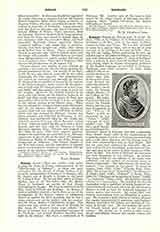

Ronan, Saint.—There are twelve Irish saints bearing the name of Ronan commemorated in the “Martyrology of Donegal”; of these the most celebrated are:
St. Ronan of Ulster, brother of St. Carnech, and grandson of Loarn, d. January 11, 535;
St. Ronan, son of Berach, a disciple of the great St. Fechin of Fore. He became first Abbot of Drumshallon, and d. November 18, 665.
St. Ronan Fionn is honored as patron of Lan Ronan (Kelminiog) in Iveagh. His feast is celebrated on May 22, both in Ireland and Scotland.
St. Ronan of Iona is explicitly referred to by St. Bede as one of the protagonists of the Roman custom of celebrating Easter as against the Irish tradition, and he had a warm controversy on the subject with his countryman St. Finan, Bishop of Lindisfarne, in 660. This controversy was ended at the Synod of Whitby, in 664, when St. Ronan’s views were upheld.
St. Ronan of Lismore was a distinguished successor of St. Carthage, and several Munster churches were built in his honor. His feast is celebrated on February 9, 763. Another saint of this name is best known by the ruined church of Kilronan, Co. Roscommon, where Turlogh O’Carolan and Bishop O’Rourke are buried.
W. H. GRATTAN-FLOOD.

